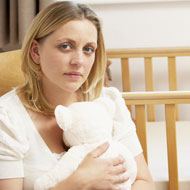- General Articles
- General Pregnancy Questions
- Baby Growth
- Pregnancy Diet
- Miscarriage
- During Pregnancy
- Twin Pregnancy
- Toddler Meals
- Home Remedies During Pregnancy
- Breastfeeding
- Pregnancy Week By Week
- Pregnancy Tests
- Ectopic Pregnancy
- Pregnancy Signs and Symptoms
- Pregnancy Stages
- Potty Training
- Fetal Development
- Preschooler
- Postpartum Depression
- Toddler Illness
- Baby Care
- After Pregnancy
- Molar Pregnancy
- During Delivery
- Beauty and Style
- Pregnancy Clothing
- Preconception
- Fertility
Post Pregnancy Hormone Changes
Hormones are chemical messengers secreted by different glands in the body. They affect the functioning of the body in many different ways and play a vital role in governing a woman’s fertility cycle and the development of the fetus during pregnancy. For example, the female sex hormone estrogen is manufactured in the ovaries and plays an important role in regulating a woman’s periods and in her getting pregnant.
Pregnancy is a time of major upheaval in a woman’s hormone levels. These changes can affect a woman in many ways, from causing outbreaks of acne to causing severe depression. The hormones whose levels are affected during and after pregnancy include:
- Estrogen – Levels of this hormone rise to about 50 times their normal levels during the last trimester of pregnancy.
They usually fall back to normal levels about three days after the birth of the baby. - Progesterone – Levels of this hormone rise to about 10 times their normal level during pregnancy. They usually fall back to normal levels within a week of childbirth.
- Cortisol – Levels of this hormone rise to approximately 2 to 3 times their normal levels. They slowly fall back to their normal levels after childbirth.
- Prolactin – Levels of these hormones that promote lactation rise to about 7 times their normal level during pregnancy. They usually fall back to normal levels within 3 months of childbirth.
How to Cope With Changes
The changes in hormone levels can have some serious effects on a woman’s body. Changes to the skin are one of the first obvious symptoms of hormonal changes. They include:
- Dry skin
- Acne and pimples
- Darkened freckles and moles
- Skin tags
- Darkened and enlarged areolas
Other changes that occur include:
- A heightened sense of smell
- Bleeding gums
- Brittle nails
- Swelling in the extremities
- Anxiety or depression
Feelings of anxiety or depression are the most difficult to deal with after childbirth. Often, the symptoms are so severe that they will interfere with the woman’s day to day functioning and will affect her ability to care for her child. This condition is termed as postpartum depression and its symptoms include insomnia, mood swings, lack of concentration, chronic fatigue, loss of sexual appetite, abnormal eating habits, feeling worthless and depressed, abnormal weight loss or gain, guilt, lack of feelings for the baby, feeling suicidal or having thoughts of injuring the baby.
Postpartum depression can be classified as either minor or major depending on the symptoms and their severity. You should consult your health care provider immediately should you experience any of these symptoms.
There are many ways to cope with all these hormonal changes and feelings of inadequacy and depression. The important thing is to allow yourself some breathing space to help you adjust to your new life. Here are some tips that will help you to cope better:
- Learn to ask for help whenever you are feeling overwhelmed.
- Get plenty of rest.
- Leave the house whenever you can. Getting outdoors can prove to be very refreshing.
- Join a support group for new moms. Lear to talk about your feelings and learn from their experiences.
- Exercise regularly. Keeping fit physically will also help you stay fit mentally.
- Eat a balanced and healthy diet with plenty of vegetables and fruit. Avoid fast food and other unhealthy food.
- Avoid smoking and drinking alcohol or caffeinated beverages.
It is important to remember that postpartum depression is a serious disorder that can affect the lives of not only the mother, but the baby and the father as well. For this reason it is important not to ignore any symptoms but to consult your doctor immediately.
If your symptoms are severe, your doctor may recommend that you consult a psychologist or undergo psychotherapy. Group therapy can also help as it helps you to connect with others who are facing a similar problem. Your doctor may also suggest medications to help ease the symptoms. Medications to correct hormonal imbalances may be prescribed in certain cases of post partum depression. Anti-depressants may also be prescribed.
Read more articles from the After Pregnancy Category.



 7 Must-Haves Before Your Baby Arrives
7 Must-Haves Before Your Baby Arrives Bonding Games for Babies
Bonding Games for Babies DIY Baby Bath Towel Apron
DIY Baby Bath Towel Apron Common Late Pregnancy Fears
Common Late Pregnancy Fears